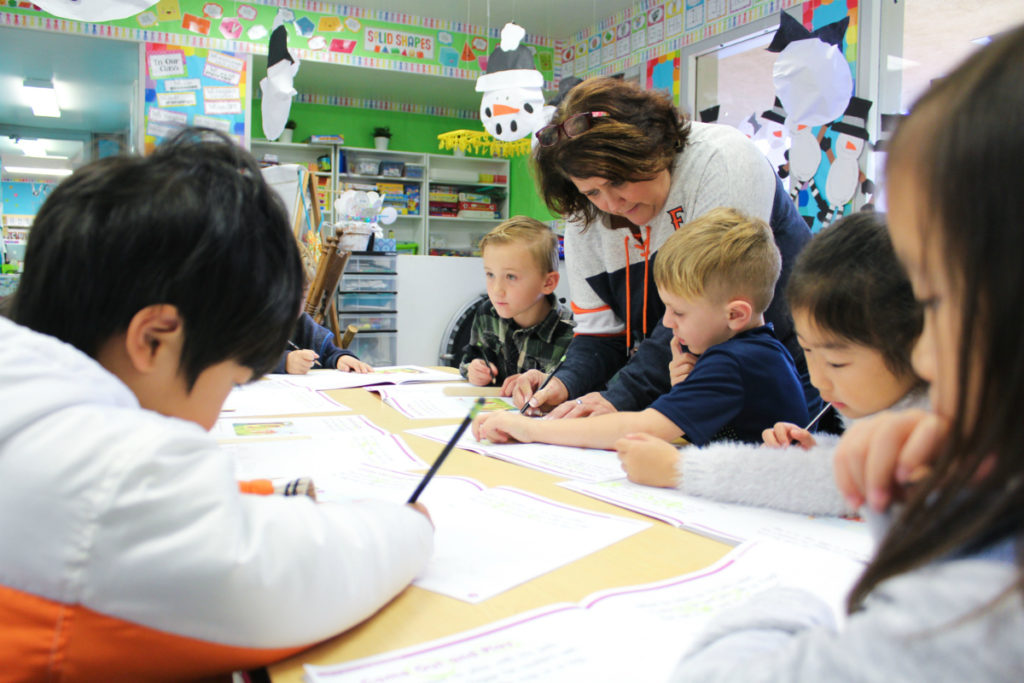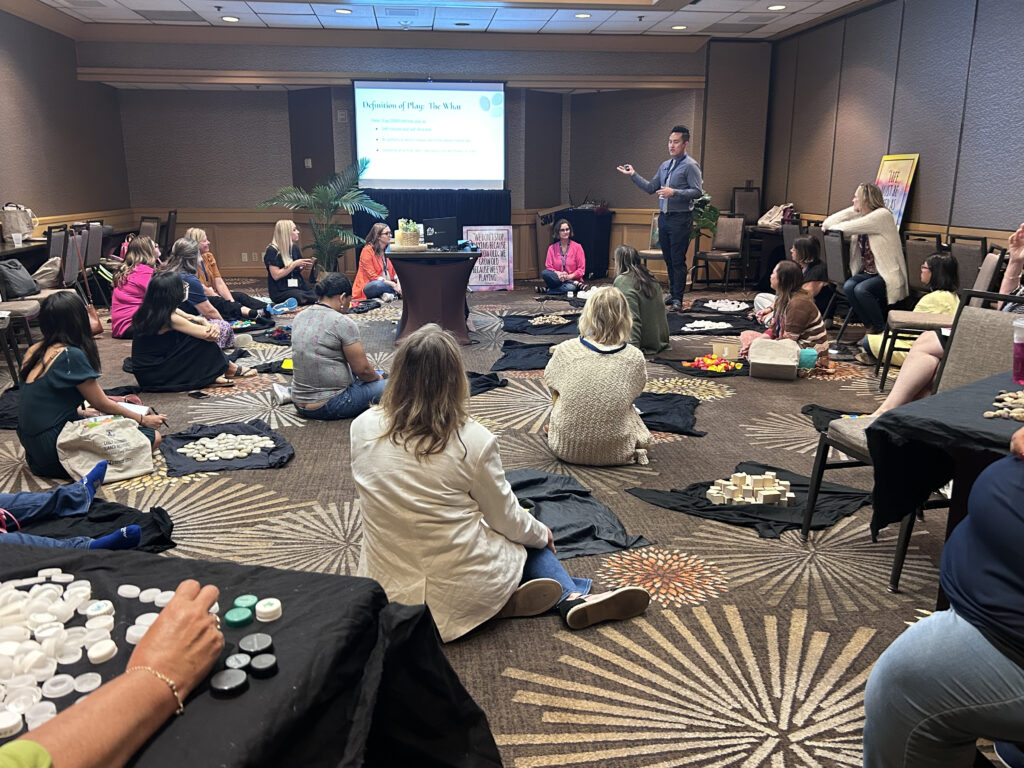
Ensuring that all early learners in California have access to a quality education has become a top priority through the state’s Universal PreKindergarten initiative.
Launched by the California Department of Education in 2021, Universal PreKindergarten aims to help families choose a high-quality early learning program that meets their specific needs through a network of options available in the state. These options include expanding California’s transitional kindergarten program, but more on that in a moment.
Since the Universal PreKindergarten effort began, early learning enrollment has nearly doubled, with more than 1.6 million children attending public prekindergarten programs in the last school year.
And here’s a new development: On July 23, the California Department of Education released new learning foundations for preschool and transitional kindergarten classrooms to better serve this growing student cohort while preparing them for future academic standards.
As demand for early learning options increases, the OCDE Newsroom — with help from OCDE’s Early Learning Services unit — has answered some common questions families or community members may have about Universal PreKindergarten and educating our youngest learners.
Are children required to be enrolled in early learning programs?
Enrollment in early learning programs is not mandatory in California. Children are required by law to attend school once they turn 6 years old. However, many parents choose to enroll their children in these programs to get them ready for elementary school or to make use of the child care benefits.
Data shows this preparation can lead to successful outcomes in the long term. According to the American Institutes for Research, prekindergarten programs — including transitional kindergarten — may help kids develop language and mathematics skills at a more rapid pace and improve engagement in classroom instruction.
So what exactly is Universal PreKindergarten?
Universal PreKindergarten is really a range of early learning options for children ages 3 to 5. These options include things like California State Preschool Programs and Head Start, alongside other community childcare services.
The goal of the initiative is to help families find the right preschool or early learning option, and the California Department of Education is supporting these programs through grant funding.
To learn what program might best fit their child, parents and caregivers can visit the state’s eligibility breakdown.
What is transitional kindergarten?
Transitional kindergarten — commonly referred to as TK — was launched to better prepare young learners for the standards they are expected to meet once they reach kindergarten and upper grade levels. It’s considered part of Universal PreKindergarten, but it also functions like an optional grade level that comes before kindergarten.
Available at no cost to families in the public school system, TK provides students with additional support through a curriculum that matches learning standards released by the California Department of Education this summer.
Since TK was introduced, the window for eligibility has expanded annually. For 2024–25, children are eligible for TK if they turn 5 between Sept. 2 and June 2. Once the state reaches the final phase of its four-year, $2.7 billion early learning expansion, every child who turns 4 by Sept. 1, 2025 will be eligible to enroll in a transitional kindergarten program that school year.
Here’s something else to know: In transitional kindergarten classrooms, at least one instructor per class is required to hold either a PK-3 Early Childhood Education Specialist Instruction Credential or a teaching credential in multiple subjects alongside additional training or experience in an early childhood education setting.
So how does Universal PreKindergarten differ from transitional kindergarten?
Between transitional kindergarten, preschool and prekindergarten, what sets these programs apart is who they serve and where each can be accessed.
While preschool offerings like California State Preschool Programs and Head Start accept students ages 3 to 4 whose families fall within a specific socioeconomic status, transitional kindergarten is gearing up to take all 4-year-old students, regardless of income.
Another key detail for families to know: Transitional kindergarten programs are offered only at public elementary schools that receive state funding. Preschool and other prekindergarten programs may operate independently.
In simple terms, preschool and prekinder programs come in a variety of forms and are tailored to children as young as 3, while transitional kindergarten teaches 4-year-olds with play-based learning experiences that blend math, literacy and science to help them gear up for elementary school subjects.
What do 4- to 5-year-olds learn in transitional kindergarten classes?
Throughout the state, transitional kindergarten programs are expected to follow guidelines from the updated California Preschool/Transitional Kindergarten Learning Foundations. This means lessons across nine learning domains will combine academic subjects like language and literacy, mathematics, science, history, health, and visual and performing arts while balancing learning through social-emotional and physical development.
Whether it’s a three-hour or six-hour program, a typical day in a TK classroom might have young learners developing their language skills by reciting songs about new subjects or learning to play alongside their classmates through hands-on activities like sorting plastic blocks by color or shape.
Learning frameworks are intended to guide early childhood educators in teaching students who learn at different paces through differing methods. By 2025, the student-to-teacher TK ratio is expected to reduce to 10:1 to better serve young learners’ individual needs.
Who can enroll in transitional kindergarten?
As we mentioned earlier, the age requirement has been expanding with each passing year.
According to the latest education budget signed by Gov. Newsom, TK programs for the 2024-25 school year will accept any child who turns five between Sept. 2, 2024 and June 2, 2025, expanding eligibility from the previous school year.
The last stage of the TK expansion, coinciding with the 2025-26 school year, will require all local education agencies — including school districts and charter schools — to make transitional kindergarten open to every child who turns 4 by Sept. 1 of the school year.
Parents can find out when their child is eligible to enroll by visiting the Universal PreKindergarten website.
How are schools planning to accommodate new students in early learning programs?
Keeping young learners’ wellbeing in mind, school districts and charter schools are working to create their own guidelines for managing active supervision and toileting independence, among other essential aspects of childcare.

That brings us back to OCDE’s Early Learning Services unit. This group has utilized feedback from the community to create programs and services that are designed to support expanded transitional kindergarten and preschool offerings.
In June, the team hosted its second annual Early Learning Summer Institute, inviting early childhood educators to network and learn from peer-led sessions on everything from increasing student involvement in the classroom to helping parents connect with their child’s behavior.
With the transitional kindergarten expansion underway, many schools plan to upgrade or construct new buildings tailored to classrooms for transitional kindergartners in half- or full-day instruction. However, statewide funding for preschool, TK and full-day kindergarten facilities has been placed on hold until 2025 due to lower revenue in this year’s budget.
Meanwhile, local districts like Garden Grove Unified are working swiftly to enroll all eligible children into expanding TK programs to meet their communities’ needs.
In line with these efforts, OCDE will continue to offer professional learning opportunities and incentives to early learning care programs and school districts in Orange County through its partnering organization, Quality Start OC.
For families interested in learning more about early learning options, visit the Universal PreKindergarten website. Parents looking to enroll their child in Transitional Kindergarten can contact their local school district for more information.
